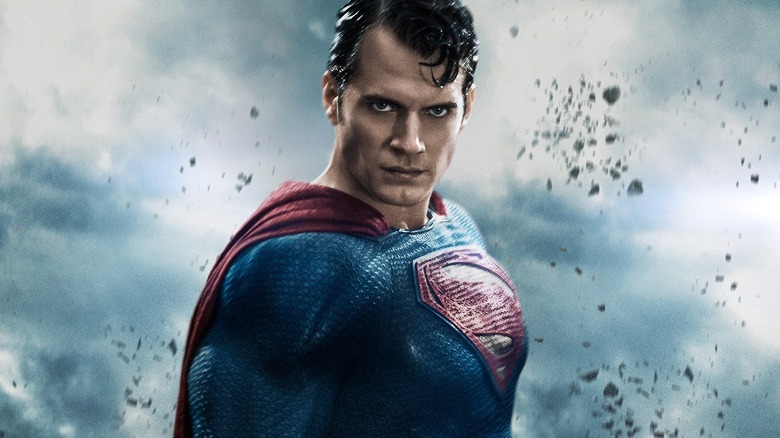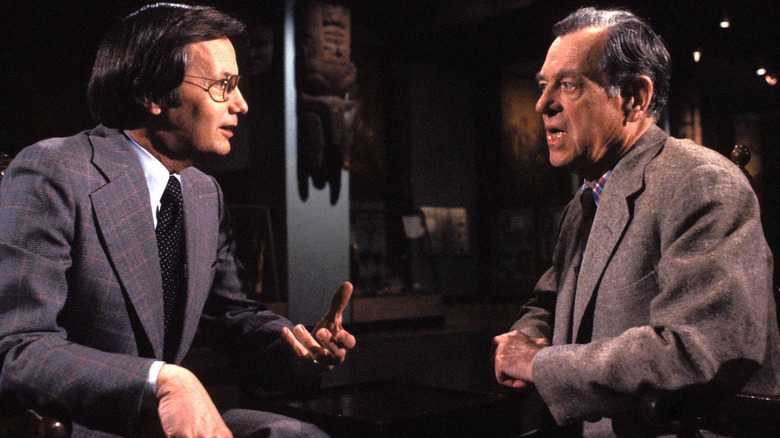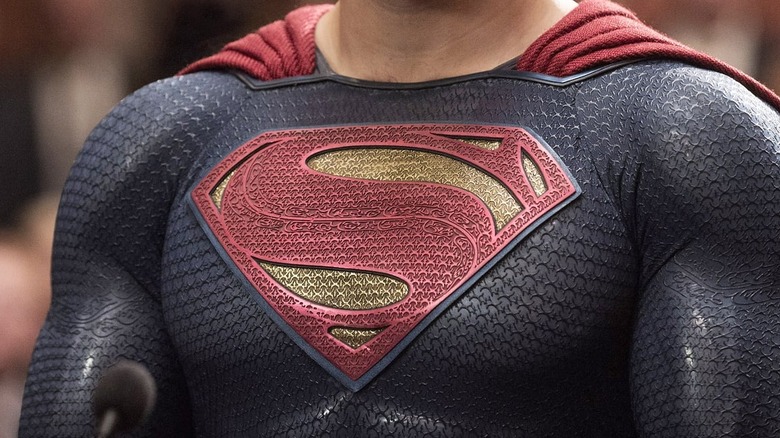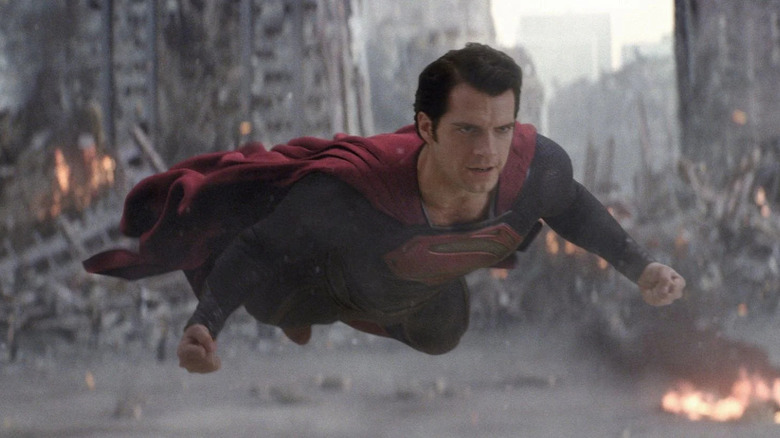The Hidden Detail In Superman's BvS Suit You May Not Have Noticed
One can say a lot of things about director Zack Snyder, the filmmaker behind "Legend of the Guardians: The Owls of Ga'Hoole" and "300," but he can never be accused of working small. Snyder has made a métier out of turning schlocky, action-packed fantasy entertainments into outsized, ponderous, navel-gazing four-hour bouts of grandiloquent bombast. Snyder is the credited director on four interconnected films in Warner Bros.' DC comics film series ("Man of Steel," "Batman v Superman: Dawn of Justice," and two drastically different cuts of "Justice League"), and served as executive producer on five others in the same series. His films tend to be overloaded, messy, and often contain Objectivist-leaning dialogue about the importance of the superior hero's place in the world. Reactions to his films have typically been mixed, with some praising his trademark fustian storytelling as elevating comic book material into the realm of the mythic, while others have criticized Snyder's films for their lack of interesting ideas and loaded-baked-potato approach to cinematic visuals.
As both his fans and his critics may be able to intuit, Snyder is a big fan of author Joseph Campbell, the famed author behind the seminal texts "The Hero with a Thousand Faces" (1949) and "The Power of Myth" (1988), the latter of which serves as a companion piece to a series of filmed interviews Campbell gave with reporter Bill Moyers, which were, in turn, the basis of an important PBS documentary series called "Joseph Campbell and the Power of Myth."
It turns out Snyder's fandom of Campbell extends into tactile homages in his work. Case in point: There is a quote from Joseph Campbell transcribed in Kryptonian and hidden on the "S" on Superman's chest in "Batman v Superman: Dawn of Justice."
Joseph Campbell
If you've attended film school, it's likely you've read the works of Joseph Campbell. His observations on what he called "the monomyth," a term he cribbed from James Joyce's "Finnegans Wake," have deeply influenced modern screenwriting. George Lucas integrated commonalities Campbell observed across multiple cultures' folklore into the screenplay of the original "Star Wars," popularizing the concept of The Hero's Journey and reshaping the minds of critics and cinephiles the world over into thinking that it is not just satisfying screenwriting, but taps into something fundamental about the human condition.
Campbell (1904 – 1987) was a literature professor at Sarah Lawrence University who specialized in comparative mythology and comparative religion. He understood that myths were very real to all human cultures, both ancient and modern, as they are among the defining elements of humanity as a species. He argued against modern thinking which argued myths were backward-engineered, as it were, from more recently discussed theories about the human mind (Freud and Jung, et al), invented to fulfill something more immediate and modern within us. Instead, he argued that all our habits, from reading sacred texts to watching TV, were all contributing to an ongoing, complex storytelling tradition intrinsic to humanity. Some have since taken his theories to a logical extreme, arguing that all stories are the same.
Folklorists and other scholars have criticized Campbell's view of the vast fabric of human endeavor as being oversimplified. Campbell also notoriously brought in far too much editorializing. Regardless, Campbell's work remains a touchstone for genre storytelling, as well as a lazy argument for defending lazy storytelling tropes in modern Hollywood screenwriting. His work was extrapolated into Blake Snyder's (no relation to Zack) overused 2005 screenwriting textbook "Save the Cat! The Last Screenwriting Book You'll Ever Need."
The Quote
If you look closely at the "S" on Superman's chest in Zack Snyder's "Batman v Superman: Dawn of Justice," you can see a river-like curve cutting through the center. On either side of the curve is a kind of writing that is barely discernable from the surrounding stippling on the costume (which was designed by Michael Wilkinson). That is, according to an interview Wilkinson gave with The Insider, the Kryptonian language. It translates as: "Where we had thought to stand alone, we will be with all the world."
That is a portion of Campbell's poem "The Hero Path," which is as follows:
We have not even to risk the adventure alone, for the heroes of all time have gone before us. The labyrinth is thoroughly known ... we have only to follow the thread of the hero path. And where we had thought to find an abomination, we shall find a God. And where we had thought to slay another, we shall slay ourselves. Where we had thought to travel outwards, we shall come to the center of our own existence. And where we had thought to be alone, we shall be with all the world.
The poem is meant as a reminder that, however confused we may feel as individuals lost in a time of struggle and conflict, we have had generations of heroes in our myths forging a path for us. You may think yourself lost, but the road has been laid, the map written. The heroes of our myths are cultural cartographers, guiding us forward.
The Philosophical Origins of Superman
According to Wilkinson, Snyder saw Superman as alienated from society — and a literal alien, in his case — who must, nonetheless, use his tremendous powers to aid humanity. Superman is, after all, an archetypal mythic hero who has bled deeply into American popular culture. Why not treat him like a monomythic hero out of Joseph Campbell?
The word "superman" is, after all, derived from the writings of Friedrich Nietzsche who argued that the Übermensch (or Superman) is the aspirational, post-spiritual, post-Christian ideal that modern humans should aspire to. Superman, in name, was always meant to be aspirational. Additionally, his Kryptonian name, Kal-El, is actually close to the Hebrew words קול אל, which loosely translates to "voice of God." Comparisons have frequently been drawn between Superman and Moses, and Jerry Siegel and Joe Shuster, Superman's creators, were two Jewish men who were likely drawing on their own faith for the some of the character's facets.
Despite Superman's place as an aspirational, near-holy figure in the American consciousness, Snyder was more interested in his alienation and his superiority. In Snyder's vision, Superman was separate from human society, better than them, beyond them. He is not a warm helper of mankind, but a nascent wrathful deity with the capacity for destruction and control. Making Superman into a dark, grounded, realistic figure is almost antithetical to what he was built for — but that didn't stop Zack Snyder.
Wonder Woman's Sword
The Joseph Campbell quote was added to Superman's chest in post-production. Wilkinson and Synder worked out the look of Kryptonian hieroglyphics and added the phrase digitally after the fact. It wasn't the only Campbell quote in the movie added in that manner: On Wonder Woman's sword, the following phrase — also in Kryptonian, so have a field day, nerds — is written: "Life is killing life all the time, and so the goddess kills herself in the sacrifice of her own animal." This is a quote from Joseph Campbell's "Goddesses: Mysteries of the Feminine Divine." The full quote is as follows:
Originally Artemis herself was a deer, and she is the goddess who kills deer; the two are dual aspects of the same being. Life is killing life all the time, and so the goddess kills herself in the sacrifice of her own animal. Each life is its own death, and he who kills you is somehow a messenger of the destiny that was yours from the start.
This is Campbell's own (distantly sexist) view of goddesses as self-sacrificing beings. One cannot be sure of the meaning this is meant to ascribe to Wonder Woman, however, as she is an immortal being who does not die nor sacrifice herself over the course of her movies. (I suppose she did renounce her wish, but that wasn't until "Wonder Woman 1984.")
I would love to see a conversation between Snyder and "Wonder Woman" director Patty Jenkins as to their individual takes on this quote.




